Water conservation program in OTOW, Stone Creek and Calesa will lower bills, water use
Residents in thousands of future southwest Ocala homes will find themselves with hundreds of dollars in annual utilities savings and a lower water footprint on the Floridan aquifer system by tens of thousands of gallons each year.
In a unique initiative, water provider Bay Laurel Center Community Development District has established a requirement that all new homes within its district must meet Florida Water Star (FWS) certification standards. This will apply to all future homes developed in On Top of the World (OTOW), Calesa Township and Stone Creek, which will be required to have water-saving appliances and irrigation practices.
At build out, the combined water savings are expected to be over 1.2 billion gallons a year.
Water management district to FDOT: We 'cannot support' proposed Florida Turnpike routes
SW Marion development: 648 units along 80th Avenue south of Calesa Township
How much did that house sell for?: Deed transfers in Ocala/Marion County | April 4-10, 2022
Bay Laurel Center CDD and the Southwest Florida Water Management District (District) have partnered on this and other initiatives to lessen the impact of Florida’s continued growth and development on its ecosystems and water resources.
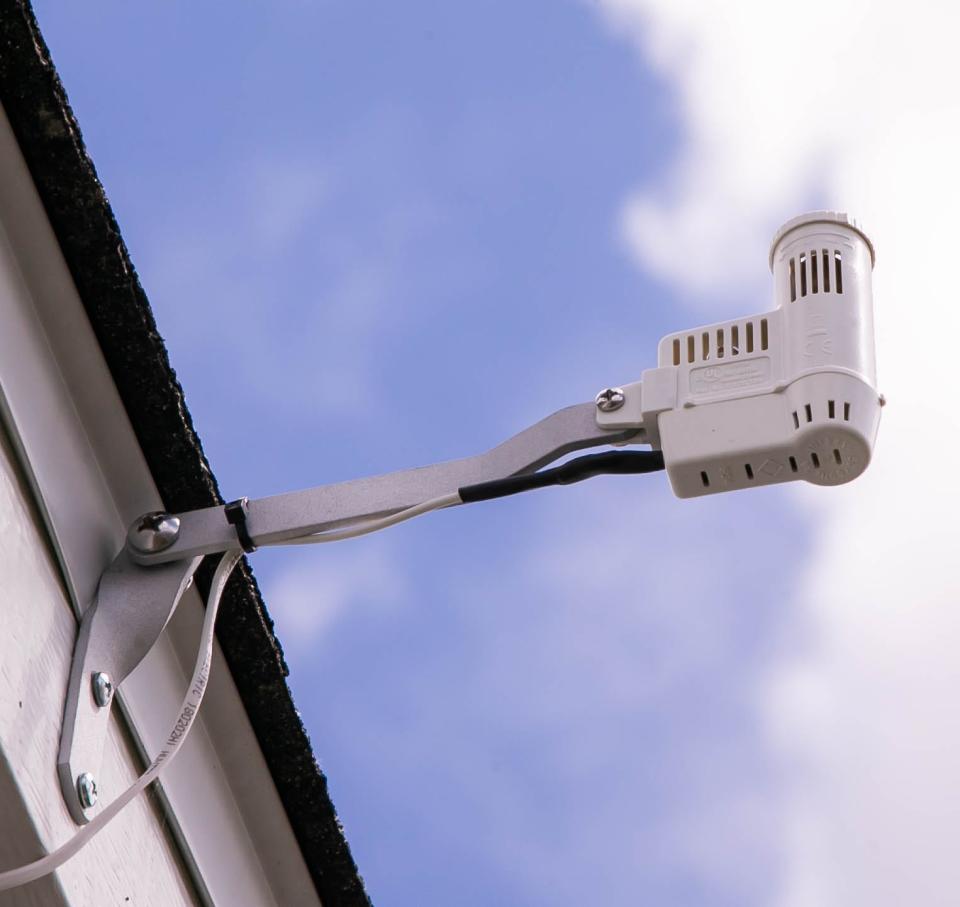
Saving water to protect springs, natural resources
“The intent of all of this obviously is to reduce groundwater withdrawals to protect our natural resources,” the company’s utility director, Bryan Schmalz, said at a new home in OTOW’s Weybourne Landing last week. “We have to begin developing homes that are water conscientious now.”
Schmalz noted nearby Rainbow Springs in Dunnellon, which falls under the water management district's jurisdiction, and Silver Springs in northeast Ocala. Both are iconic Marion County features and some of the largest first-magnitude spring groups in the state.
“As we continue to withdraw water, everybody in the state of Florida continues to withdraw water, the impact to the springs can be extremely damaging,” he said. “What we have to do is make sure we're protecting our natural resources and also protecting our springs.”
Bay Laurel Center CDD encompasses approximately 20 square miles, including developer Colen Built’s OTOW and Calesa Township, and PulteGroup’s Del Webb Stone Creek.
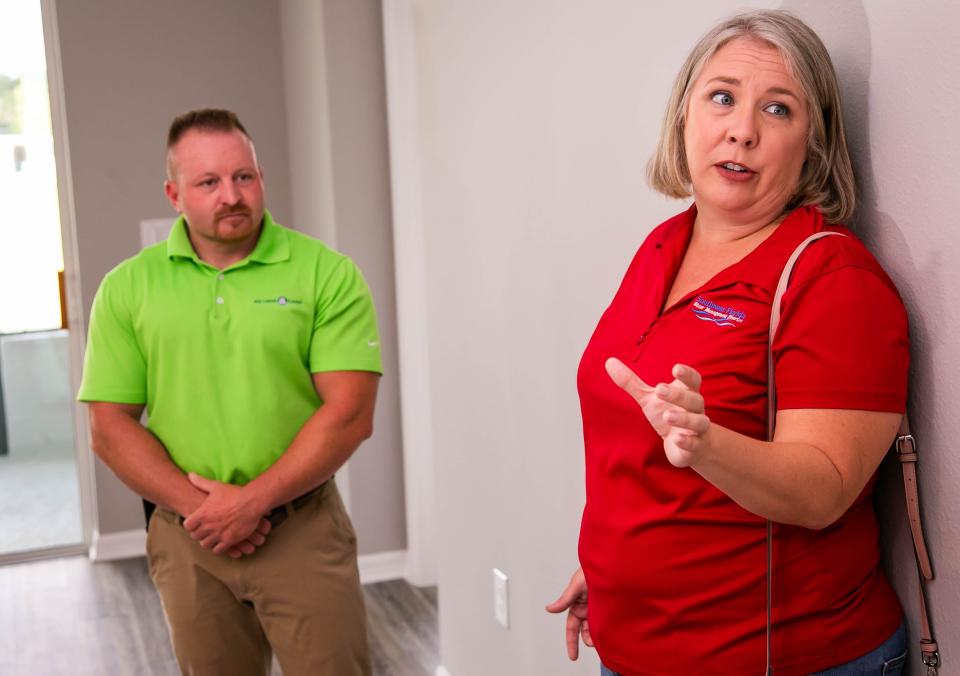
At build out in 25 to 30 years, around 26,000 new homes between the three developments will have achieved FWS certification. Each will save around 48,000 gallons of water annually compared to a traditional home.
"The big thing with that 1.2 billion gallons reduction in water, a huge benefit of this is it's really offsetting the need to develop further alternative water supplies like drilling deeper into the aquifer or aquifer recharge projects,” Robin Grantham, FWS coordinator for the district, said, noting alternative supplies would raise utility bills.
The Southwest Florida Water Management District, which spans 16 counties including west Marion County, allows Bay Laurel Center CDD to withdraw up to 150 gallons of water per person per day for indoor and outdoor use.
While the water conservation initiatives are aimed to comply with permitting requirements and be better stewards of the environment, homeowners of FWS homes will also see annual savings of around $530.
Florida Water Star homes require efficient appliances, practices
The Florida Water Star program was established in 2006 by the St. John’s River Water Management District, which spans 18 counties in east Florida, including east Marion County.
OTOW has been voluntarily constructing some FWS homes since then, though it partnered with the Southwest Florida Water Management District in 2017 for FWS certifications and has been making most homes to comply with the water-saving initiative over the past five years.
Around 700 of more than 7,000 OTOW homes have achieved FWS Silver certification so far. As of June 1, Bay Laurel Center CDD requires all new homes to be certified before transferring water service to the resident. There are over 8,000 FWS-certified homes across the state currently, which will continue to rise not only with initiatives in other counties but with the 26,000 in the Bay Laurel district.
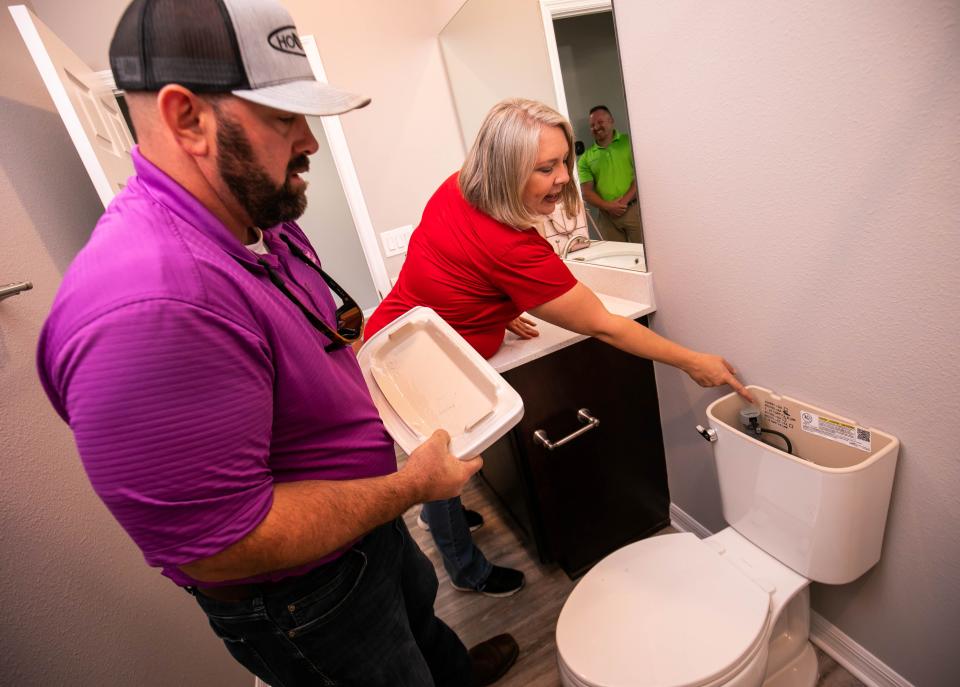
For a home to meet FWS Silver requirements, indoor and outdoor standards must both be met. (There are additional requirements for a Gold Tier.)
Inside, dishwashers and clothes washing machines must be Energy Star appliances. Bathroom faucets must use no more than 1.5 gallons per minute, and shower heads must use no more than 2 gallons per minute, both 0.5-gallon reductions from state code.
The maximum use for toilets is 1.28 gallons per flush, compared to state requirements of 1.6.
“Also what we look for are the water supply lines, that they need to be reinforced and that's because nationally the number one indoor flood insurance complaint is broken water supply lines,” Grantham said.
Irrigation is the biggest water user
Outdoors, each sprinkler head must have a check valve, which prevents water from leaking when the system is turned off, and pressure regulation. Plants must be at least 2.5 feet from the house and landscape beds micro-irrigated, meaning water drips directly on each plant. Plants must also be suited to the environment and not invasive exotic species.
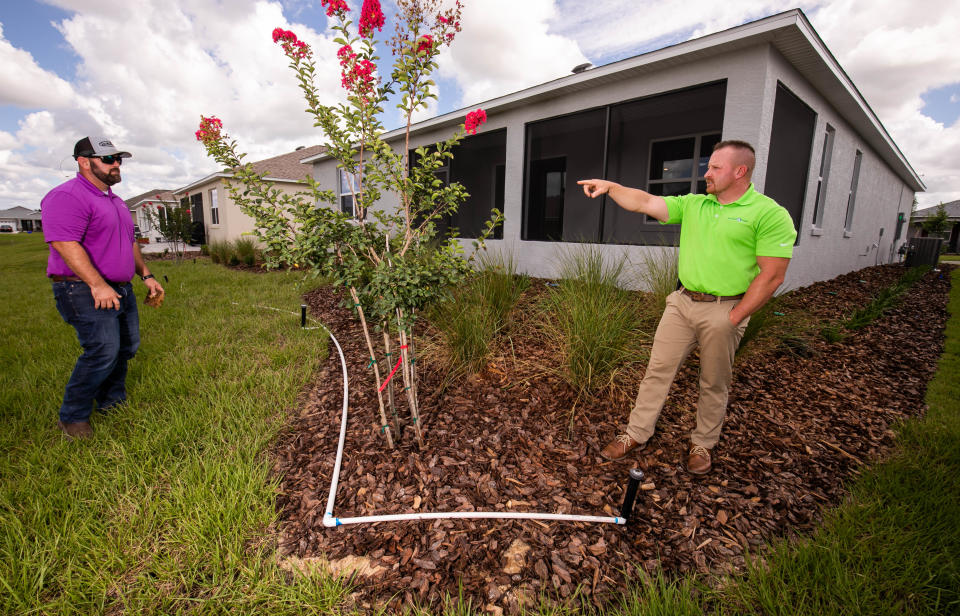
“That’s the biggest problem we see is most of our water is utilized for irrigation,” Schmalz said. “The indoor is actually minimal. A little over 82% of our water is utilized for irrigation.”
One of the FWS requirements aimed to combat that is that no more than 60% of the yard can use high-volume irrigation.
“That remaining 40% of the landscape area, what they've chosen to do here is have unirrigated bahia turf in the backyards,” Grantham said, or they can have a micro-irrigated plant bed extended to the backyard rather than a grass that needs heavy irrigation.
Bay Laurel Center CDD has also gone above and beyond FWS standards to require new residential landscape and irrigation systems designed so no more than 6,000 gallons a month are used for irrigation. Previously, around 12,500 gallons were used for irrigation each month.
The utilities provider additionally requires rotary head sprinklers, which are 30% more efficient than traditional sprinkler heads.
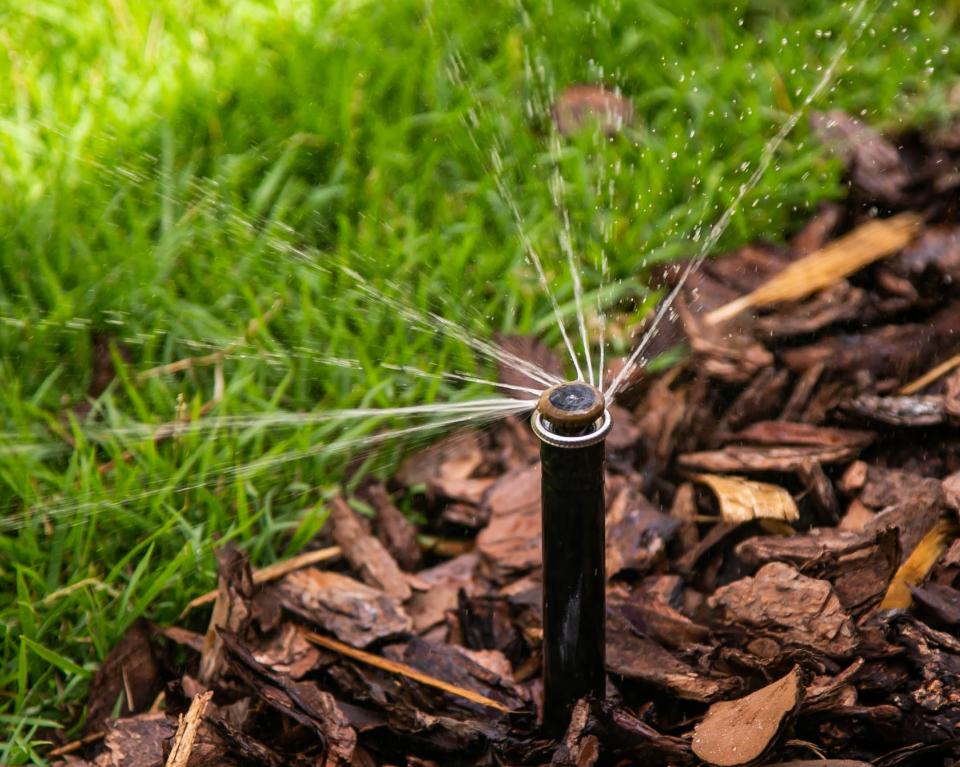
Many of the homes in the three neighborhoods also have optional water conservation measures, such as smart irrigation controllers that adjust to weather conditions and flow meters that monitor irrigation.
The communities also practice what they preach in terms of unirrigated grasses, drip irrigation for plant beds and plant species suited for Florida.
“All of our common areas are (unirrigated) bahia grass. We don’t use zoysia grass or St. Augustine, anything irrigated in our common areas,” said Phillip Hisey, director of landscape operations for Parkway Maintenance & Management at On Top of the World.
Bay Laurel is taking on a unique role as a utility provider
Grantham says 10 municipalities in Polk County have written Florida Water Star into building code, meaning the cities will not grant a certification of occupancy without the FWS certification.
“This is truly unique that Bay Laurel is taking this incentive regarding the transfer of water services,” she said. “There's not another water utility provider in Florida that has taken that much of an initiative to really try to reduce the water use in new construction.”
The district and Bay Laurel had partnered for a Cooperative Funding Initiative project in 2018 that covered builder costs for FWS certification on 75 homes to educate builders on the program and its benefits.
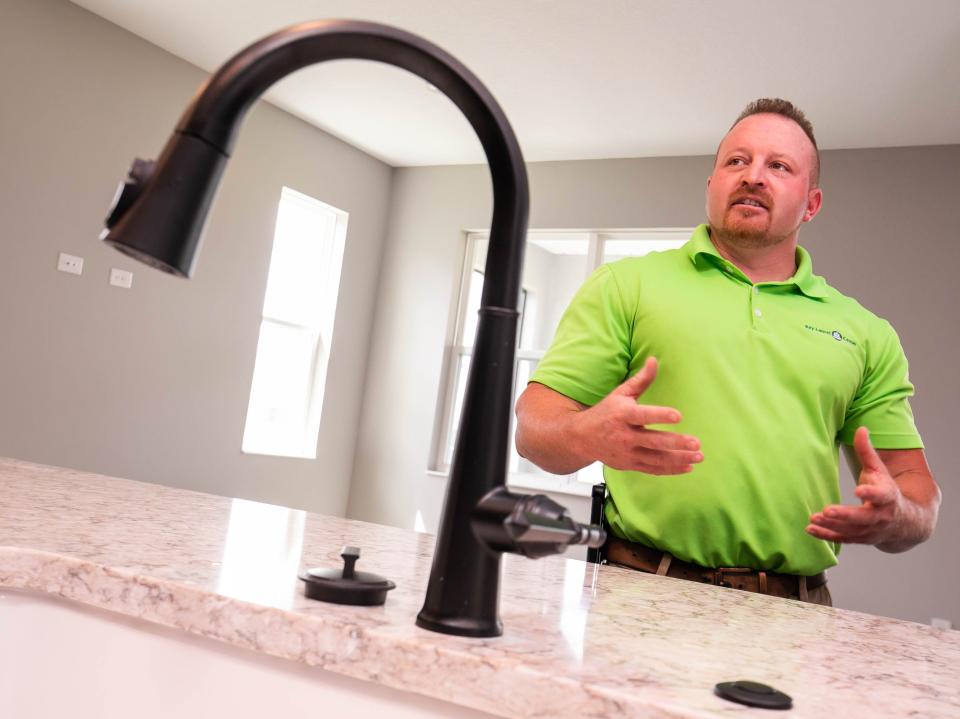
The district is also a partner by way of training third-party inspectors to document that standards are met, providing marketing materials for the communities and educating homeowners on the certification.
Now, the improved appliance and irrigation system costs will be the responsibility of the builders, but there are longer term benefits.
“One of the reasons why Florida Water Star new construction is so important is because once a home is already constructed, the legacy homes, it's much more expensive to retrofit an existing home to these efficiency standards versus just constructing with those standards,” Grantham said.
Implementing FWS and other conservation measures is a win for all
For the legacy homes that do not require certification, Bay Laurel has other incentive programs and services to conserve water, many of which the District partners on.
They include incentives to change out toilets, replace shower heads and upgrade irrigation controllers. Bay Laurel also does free water irrigation audits and has a turf grass reduction program where homeowners receive money to reduce the amount of grass on their property in favor of lower maintenance shrubs.
Grantham and Schmalz say it’s also important for homeowners to keep the FWS measures in place when it's time to replace sprinkler heads, for example, or other features, and that the FWS certification program is a win for all parties.
“The benefits of the Florida Water Star-certified home cross many lines,” Grantham said. “It’s beneficial for Bay Laurel utilities because they're able to meet or hopefully this can assist them in meeting their permitting quantities that they need. It's beneficial to the builder as well because it is a selling feature, and then it's also beneficial to that home buyer as far as their utility savings, and definitely it's beneficial to our water supply resources.”
To learn more about FWS requirements, visit floridawaterstar.com. For Bay Laurel water conservation initiatives, blccdd.com, and for district information, swfwmd.state.fl.us.
Contact reporter Danielle Johnson at djohnson@gannett.com.
This article originally appeared on Ocala Star-Banner: Water program will save 1.2 billion gallons across 26,000 Ocala homes

